Hospital CEO model patient
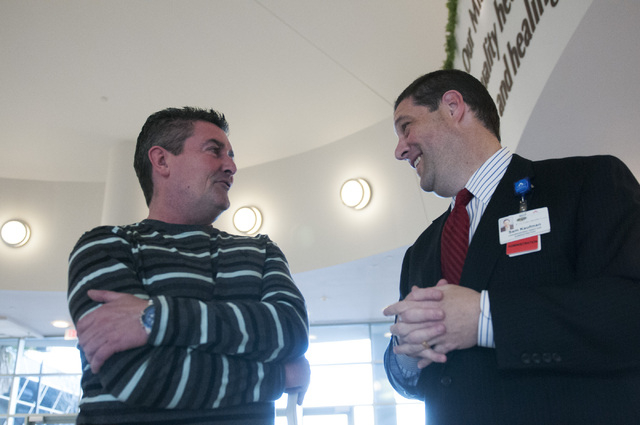
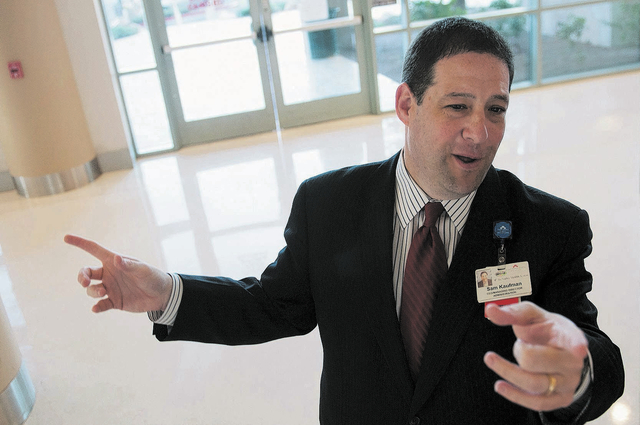
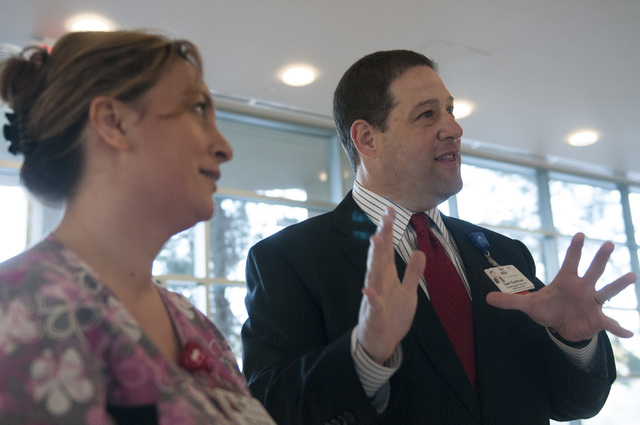
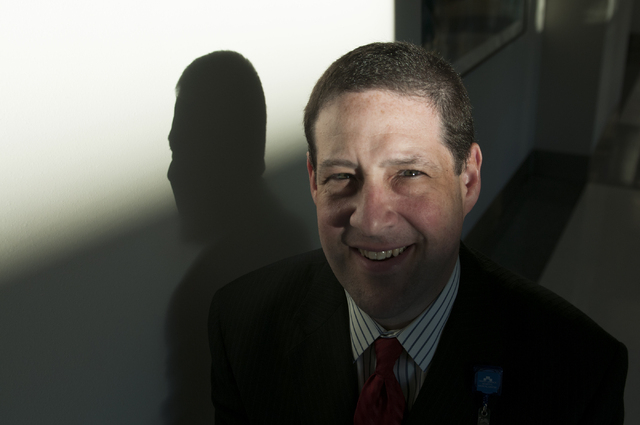
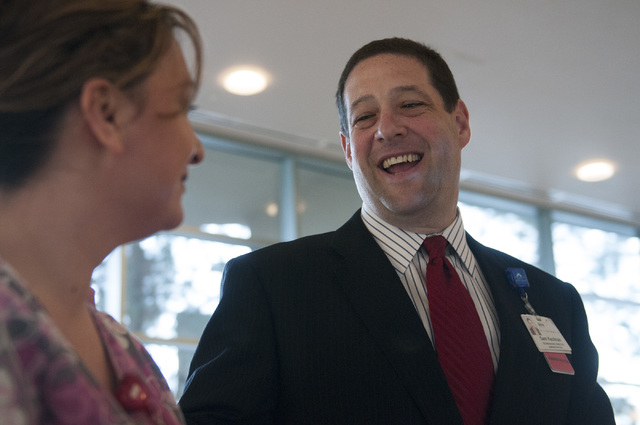
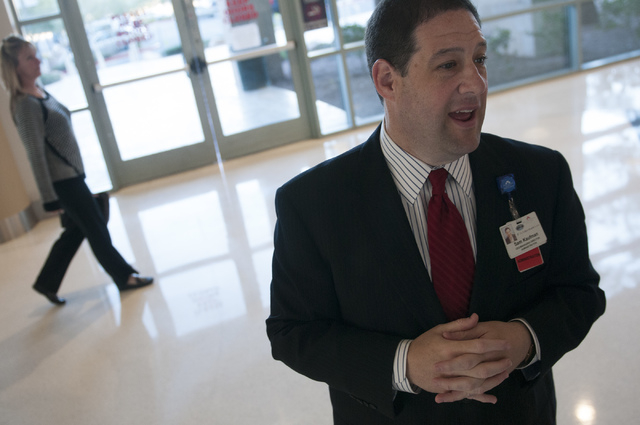
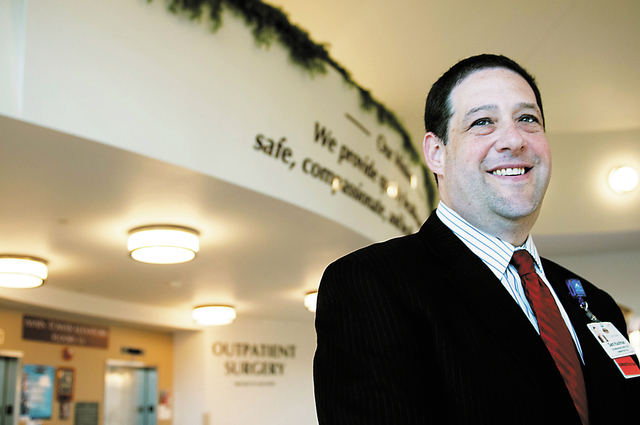

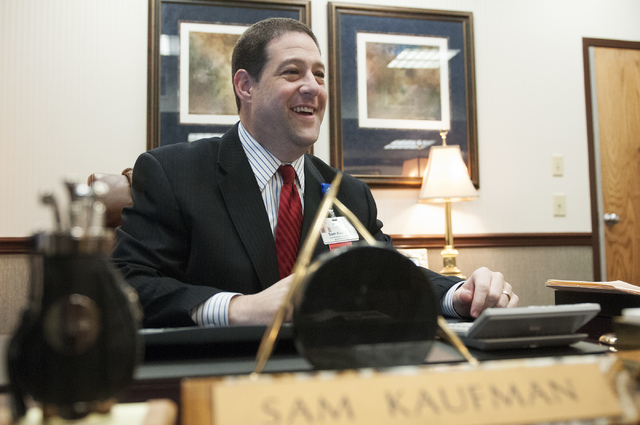
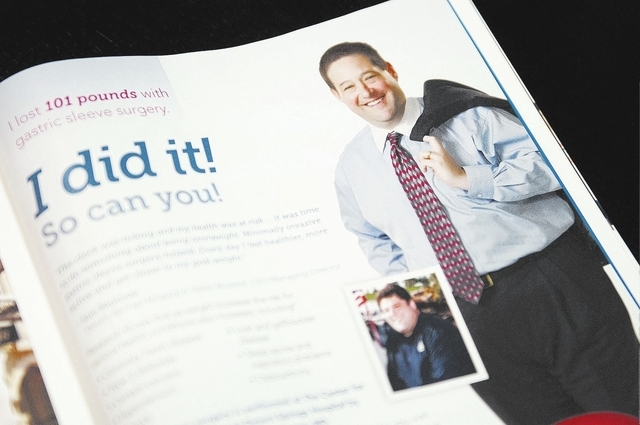

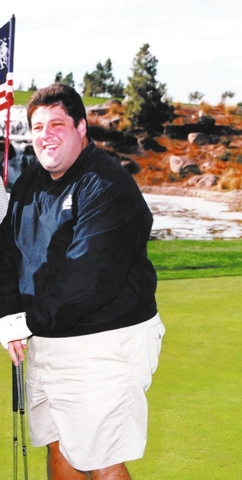
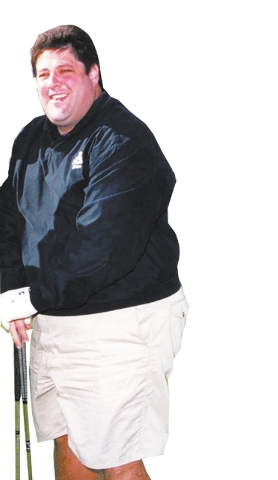
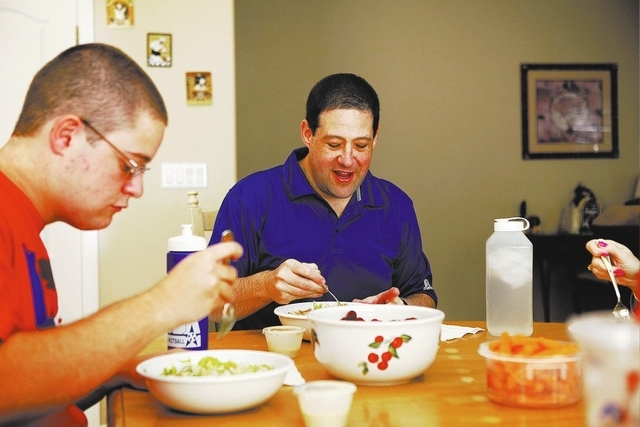

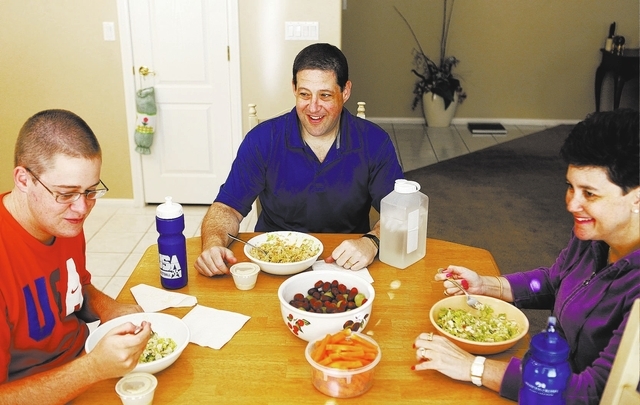

Andrea Kaufman had difficulty sleeping at night.
Not because of insomnia or nightmares.
Or because one of her babies needed feeding. All four of her boys were well past that stage.
Snoring — by the love of her life, the 5-foot 9-inch, 350-pound Sam Kaufman — was responsible.
“It was horrific,” she recalled.
Even the continuous positive airway pressure machine and mask he began to use to treat his sleep apnea and snoring didn’t give her a restful night’s sleep.
“It helped with the snoring but there was a noise associated with the CPAP, too,” she said.
What allows Andrea Kaufman to talk about her husband’s snoring in the past tense, to get a good night’s sleep, wasn’t finding a comfortable pair of earplugs.
It is what he did last April after years of thinking about it that made the difference — he underwent bariatric, or weight-loss, surgery.
“It’s really been wonderful for him and the whole family,” she said. “His blood pressure, cholesterol and pre- diabetes problems are gone. … Sam wanted to be with his family for many years to come. … He has more energy, can play ball more with his sons, walk up stairs without breathing hard. … Because our son Evan saw what his father did, he got on a weight-loss program.”
If you think this is the kind of anecdote that might embarrass Sam Kaufman, then you don’t know the man who is CEO at both Desert Springs and Valley hospital medical centers.
“There’s nothing embarrassing about making yourself healthier,” Kaufman said recently as he sat in his Valley Hospital office.
He is 232 pounds after undergoing a gastric sleeve procedure in which about 85 percent of his stomach was removed, leaving a thin vertical sleeve, or tube, that is about the size of a banana. Kaufman wants men and women to know that he’s been there and done that when it comes to weight problems.
Yes, he did virtually every diet and exercise program. He’d lose weight on a program, but when he ended it, he’d pack on even more pounds. He was the yo-yo dieter personified.
He’s come to the conclusion that by being open about what he’s been through, it might make others healthier. It might even save lives.
“This is something many of us have to think and talk about for our own good,” he said. “My biggest challenge with food is that I never felt full. I always felt hungry.”
He hopes the fact that last year the American Medical Association officially recognized obesity as a disease could induce physicians to pay more attention to the condition and spur more insurers to pay for treatments.
No, he’s not urging people to get bariatric surgery — he believes it should be a last resort — but he is urging men and women, with the help of their physicians, to take control of their weight and that of their children. Otherwise, they’ll remain part of the 70 percent of Americans who are carrying far too much weight.
To do nothing, he said, means Americans will continue to spend nearly $200 billion a year on obesity-related illnesses and conditions, and put themselves more at risk for heart and kidney disease, stroke, high blood pressure, diabetes, and cancers of the esophagus, breast, colon, rectum, kidney, pancreas, thyroid, gallbladder and lining of the uterus.
The more he talks with patients with conditions often caused by weight problems, the more he realizes that his struggle with weight mirrors many of theirs.
Family history and genes, he believes, played a critical role in his own weight problems.
Studies have shown that genes may affect the amount of fat you store in your body and that your chances of being overweight are greater if one or both of your parents are obese.
Kaufman grew up in Maryland, the son of parents who always struggled with their weight. Exercise wasn’t stressed and high caloric foods were always around the house. His father owned a deli so heavy, rich food that included pastrami, and bagels with cream cheese were staples of the family diet.
“Children adopt the habits of their parents,” Kaufman said.
Given that knowledge, it is incumbent upon parents, with the help of physicians and other medical professionals, to break the cycle, Kaufman said.
“We need to be much more proactive in childhood,” he said. “Portion control is a big thing. Our children are eating way too much. And they’re not exercising because of things like video games. That has to change. In schools children need to be taught what can happen because of too much weight. … Overweight children grow up to be morbidly obese with all kinds of health problems.”
Kaufman said he was taunted about his weight in school — he was then well over 200 pounds — but he worked hard at sports, such as baseball and tennis, to overcome the jeers and become “one of the guys.”
In college, while studying health administration at the University of Pittsburgh, he picked up weight as he not only ate regular meals, but also the pizza and burgers that are the staples of late-night study and gab sessions. It was then that his yo-yo dieting, which he acknowledges is dangerous because of the strain it puts on vital organs, really began. He wanted a social life, to date.
That the dieting worked for a while is evidenced by a picture on his desk that shows him with Andrea on their wedding day 22 years ago. He looks muscular, right around the 210 pounds he wants to be now.
But after taking a midlevel executive position with Desert Springs Hospital in the mid-1990s, his weight started upward again.
“I’m a stress eater,” he said.
In 2004, when he was chief operating officer at Desert Springs, he started a bariatric program at the hospital. By then he was clearly obese and received advice from other executives “about having the right executive look.”
“I didn’t like hearing it, but I needed to hear it,” he said.
He realized he “looked kind of hypocritical” after starting a weight-loss surgical program and not using it.
“I seemed like a pulmonary care doctor who smoked — not the best champion of a cause,” he said. “There I was with a great weight-loss surgical program and it looked like I was telling the world it wasn’t for me.”
But he wanted to research his options, as any health consumer should. “Any weight-loss surgery is still a major operation,” he said. “You don’t jump into it.”
He tried new diets, but again started putting weight back on almost as soon as he finished them.
Although he saw people have great results from gastric bypass surgery, he didn’t like the fact that surgeons had to create a small stomach pouch to restrict food intake and also construct bypasses of the small intestine to cause decreased ability to absorb calories and nutrients from food.
“It seemed too complicated,” Kaufman said.
Keeping a band around his stomach so a doctor could tighten or loosen it to minimize side effects and improve weight loss seemed too intrusive, he said.
Not until Dr. James Atkinson and Dr. Darren Soong, weight-loss surgeons at Desert Springs, started performing a new procedure, sleeve gastrectomy, a few years ago did Kaufman decide on surgery.
“When the sleeve came out, I had no more excuses,” Kaufman said. “It had minimal upkeep and was a permanent restriction, which I needed.”
Atkinson and Soong, who performed the 38-minute procedure on Kaufman at Desert Springs, said the sleeve is overtaking the gastric bypass as “the gold standard” of weight-control surgery.
“It’s a much simpler procedure,” Soong said. “We’re simply reducing the size of the food reservoir.”
What also helps, he said, is that much of the ghrelin hormone that makes a person feel hungry is removed during the surgery.
“That was very important to me,” Kaufman said. “I don’t have that big hunger any more.”
Because the procedure is so straightforward, Atkinson said the chances of complications are greatly reduced. An overnight stay in the hospital is all that is needed. About 85 percent of the procedures he and Soong do are “sleeve.” People have to be around 75 or 80 pounds overweight to be a candidate for the surgery.
“I don’t think we’ll be doing many more gastric bypasses,” Atkinson said.
A 2010 study published in the Journal of the American Medical Association, where researchers followed 15,000 patients in Michigan who had bariatric surgery, found that serious complications were most common after gastric bypass (3.6 percent), followed by sleeve gastrectomy (2.2 percent) and adjustable gastric band (0.9 percent) procedures. Fatal complications occurred in 13 patients receiving gastric bypass and in two patients receiving the gastric band. No one died after the sleeve procedure.
In 2013, researchers with Virginia Commonwealth University found that the total complication rate out of 490 patients who had gastric sleeve surgery was 3.2 percent, including a few cases of vomiting and dehydration, bleeding, blood clots and reflux. A complication involving a pulmonary embolism, a blood clot that traveled from the leg to the lung, resulted in death.
To Kaufman, the risks of surgery were far outweighed by its benefits.
“When you think of all the life-threatening problems created by obesity, by the fact that you really can’t enjoy life, it’s really a risk you can’t not afford to take if you’ve tried everything else,” he said.
Dr. Ivan Goldsmith, an internist who does all he can with his TrimCare weight control program to prevent people from getting surgery, said Kaufman went about his search for weight control the right way.
“He did everything he could, but nothing worked for him,” Goldsmith said. “He only did surgery to be heathy.”
Not long after Kaufman recovered from his procedure, Gretchen Papez, director of public relations and media relations for the five-hospital Valley Health System, asked him if she could use his experience to highlight the bariatric program at Desert Springs. When he said he’d think about it, she didn’t know what to expect.
That his story would later become a full-fledged marketing campaign with TV commercials and a blog stunned her. “I just had no idea that would happen,” she said.
Kaufman said he never planned on telling people how he moved off the liquid diet required in the wake of the procedure to solid foods. Or that he only eats or drinks 4 ounces of food during his three meals a day now.
“But I realized I could help some people if I shared my story,” he said.
One person who says Kaufman helped him was Eric Dievendorf, clinical manager of American Medical Response, a private ambulance company.
“I was skeptical about surgery, but once I saw a CEO would do it, I realized it had to be safe,” Dievendorf said. “I was just glad my insurance decided to cover it.”
Before his gastric sleeve surgery last spring, the 6-foot 1-inch paramedic was 410 pounds. He’s dropped 118 pounds and hopes to lose 30 more. Like Kaufman, he hasn’t decided whether he’ll need plastic surgery to deal with excess flesh.
“I feel great, like a new person,” Dievendorf said. “I don’t miss the backaches I had from being so heavy at all. I eat about 4 ounces at each meal now and enjoy it. I really chew it.”
Kaufman, too, feels great. He enjoys talking with people in restaurants who recognize him from the commercials. Still, as good as he feels, he knows it’s possible that he could put the weight on by eating or drinking foods and beverages that have too many calories. Some people do just that.
“No weight-loss operation can completely stop a person from gaining weight if he’s intent on it,” Atkinson said. “Instead of eating three small meals a day, some of them eat several.”
But Kaufman said he’s not worried about putting the weight back on.
“I was so ready for this,” he said. ” I don’t have hunger problems at all. I still enjoy going out with my family to eat. I just eat a little protein and vegetables and I feel great.”
Contact reporter Paul Harasim at pharasim@reviewjournal.com or 702-387-2908.












